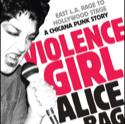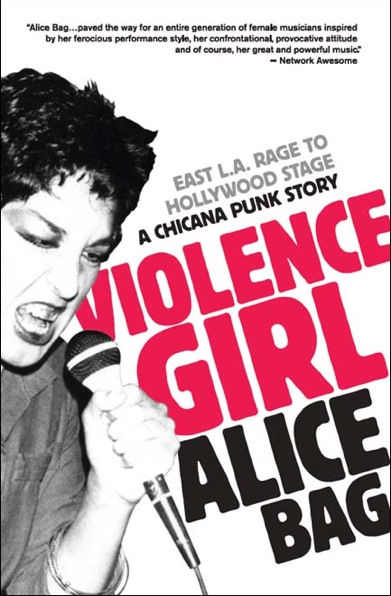
Violence Girl
by Alice Bag
Feral House

Despite the veritable onslaught of substantive and enjoyable punk history and memoir over the last decade, the voices and perspective of women in the punk scene have been sadly thin on the ground. Besides Patti Smith’s superb Just Kids and Sara Marcus’ Girls to the Front: The True Story of the Riot Grrrl Revolution, what else comes immediately to mind? Tilting the balance is this new title from iconoclastic imprint Feral House, a memoir from pioneering L.A. punk Alice Bag, vocalist in The Bags and member of ur-goth outfit the Castration Squad. Bag was at the forefront of the first wave of L.A. Punk, a scene that also gave birth to the Germs, the Screamers, and X, and is pretty damn near the most creative and flamboyant flowering of the young punk movement. In addition to being one of the first and most self-assured of the female musicians in L.A. punk (along with bassist and bandmate Patricia Morrison), Bag as a Chicano is a singular and important voice/perspective on punk rock and alternative culture. And thank god, she’s a damn good writer to boot. Her tone and style are direct and conversational; the book is broken up into a series of small vignettes that, taken together, present the multiplicity of experiences of her young life (the bulk of the book deals with her life up to her leaving Castration Squad). And she pulls no punches, including with herself, whether she’s writing about growing up poor and Hispanic in Los Angeles, gushing about her embarrassing teenage Elton John ultra-fandom, or recounting a lifetime of Punk! Rock! Adventure! that was squeezed into about maybe five years.
Teenage glam rock devotees to the hilt, Alice and Patricia Morrison were inspired by the likes of the Weirdos and the Sex Pistols to pick up instruments and become their own stars. Quickly falling in with the Weirdos, the Germs, and the rest of the “Masque Scene” overseen by Brendan Mullen, the Bags were one of the more important elements of the L.A. punk scene – one that favored art and performance, but still revelled in the violent unpredictability that would later give birth to hardcore.
With a memory that’s surprisingly razor sharp (how many of you remember what you were doing during your teenage years?), Alice traces her music obsession from fan (glam rock) to world’s worst groupie to active participant in punk, galvanized after catching an early Weirdos show, to driving force in the scene as the Bags really started to make a mark, or a violent gash, whatever. The anecdotes are many and mesmerizing: an early photo shoot wearing bags walking down Hollywood Blvd, losing control during early shows, tussles with Darby Crash, sharing the stage with the Screamers and the Germs, touring, fracases with Tom Waits, living in the punk rock hotel at the Canterbury, seeing the Sex Pistols, opening for Iggy Pop, the list goes on and on. But it’s equally fascinating how, unlike many of her fellows in the scene, Alice had to juggle this utter chaos with working jobs, going to school, and often living with her very conservative family. And somehow, despite her youth, she pulled it all off. Like all of the great early punk and hardcore bands, the Bags, coming off an appearance on Decline, disintegrated way too soon for reasons no one even remembers now, leaving behind a wealth of influence, but only a small clutch of recordings. As Violence Girl (named after the harrowing berserker rages that would often overtake her) ends, Bag applies the lessons of punk rock to a life of activism, and hell if that ain’t way more punk than a depressing clutch of reunion shows.
I demand a Castration Squad sequel.
Feral House: http://feralhouse.com












